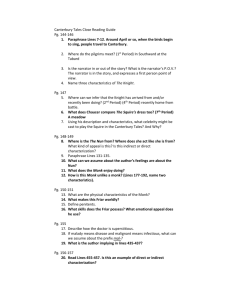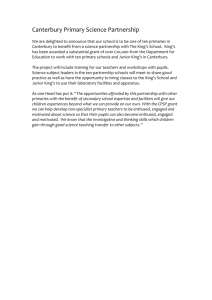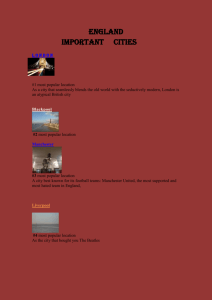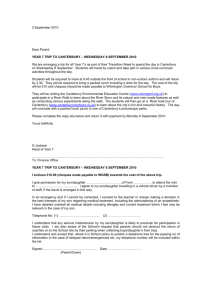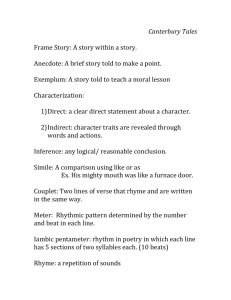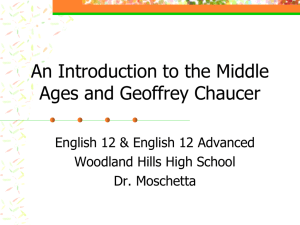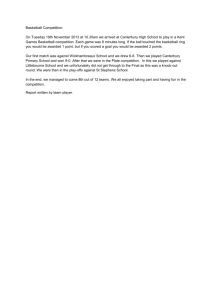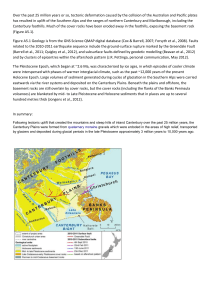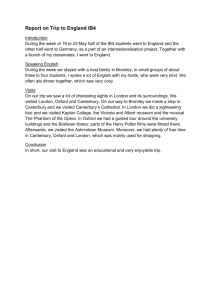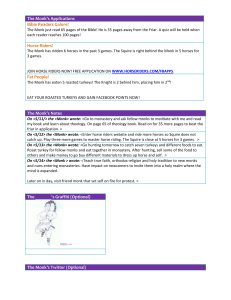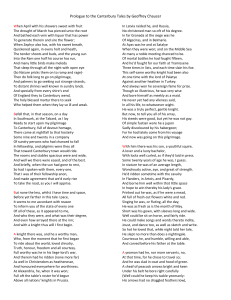The Canterbury Tales: The Prologue Geoffrey Chaucer translated by
advertisement
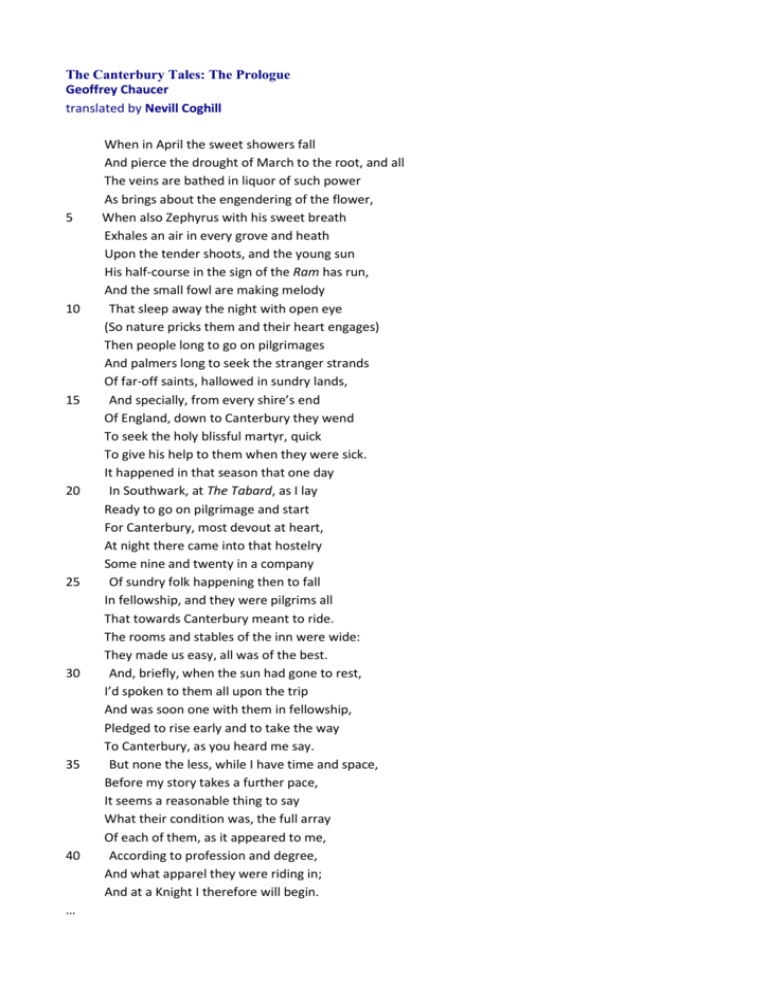
The Canterbury Tales: The Prologue Geoffrey Chaucer translated by Nevill Coghill 5 10 15 20 25 30 35 40 … When in April the sweet showers fall And pierce the drought of March to the root, and all The veins are bathed in liquor of such power As brings about the engendering of the flower, When also Zephyrus with his sweet breath Exhales an air in every grove and heath Upon the tender shoots, and the young sun His half-course in the sign of the Ram has run, And the small fowl are making melody That sleep away the night with open eye (So nature pricks them and their heart engages) Then people long to go on pilgrimages And palmers long to seek the stranger strands Of far-off saints, hallowed in sundry lands, And specially, from every shire’s end Of England, down to Canterbury they wend To seek the holy blissful martyr, quick To give his help to them when they were sick. It happened in that season that one day In Southwark, at The Tabard, as I lay Ready to go on pilgrimage and start For Canterbury, most devout at heart, At night there came into that hostelry Some nine and twenty in a company Of sundry folk happening then to fall In fellowship, and they were pilgrims all That towards Canterbury meant to ride. The rooms and stables of the inn were wide: They made us easy, all was of the best. And, briefly, when the sun had gone to rest, I’d spoken to them all upon the trip And was soon one with them in fellowship, Pledged to rise early and to take the way To Canterbury, as you heard me say. But none the less, while I have time and space, Before my story takes a further pace, It seems a reasonable thing to say What their condition was, the full array Of each of them, as it appeared to me, According to profession and degree, And what apparel they were riding in; And at a Knight I therefore will begin. 170 175 180 185 190 195 200 205 210 A Monk there was, one of the finest sort Who rode the country; hunting was his sport. A manly man, to be an Abbott able; Many a dainty horse he had in stable. His bridle, when he rode, a man might hear Jingling in a whistling wind as clear, Aye, and as loud as does the chapel bell Where my lord Monk was Prior of the cell. The Rule of good St. Benet or St. Maur As old and strict he tended to ignore; He let go by the things of yesterday And took the modern world’s more spacious way. He did not rate that text at a plucked hen Which says that hunters are not holy men And that a monk uncloistered is a mere Fish out of water, flapping on the pier, That is to say a monk out of his cloister. That was a text he held not worth an oyster; And I agreed and said his views were sound; Was he to study till his head went round Poring over books in cloisters? Must he toil As Austin bade and till the very soil? Was he to leave the world upon the shelf? Let Austin have his labour to himself. This Monk was therefore a good man to horse; Greyhounds he had, as swift as birds, to course. Hunting a hare or riding at a fence Was all his fun, he spared for no expense. I saw his sleeves were garnished at the hand With fine grey fur, the finest in the land, And on his hood, to fasten it at his chin He had a wrought-gold, cunningly fashioned pin; Into a lover’s knot it seemed to pass. His head was bald and shone like looking-glass; So did his face, as if it had been greased. He was a fat and personable priest; His prominent eyeballs never seemed to settle. They glittered like the flames beneath a kettle; Supple his boots, his horse in fine condition. He was a prelate fit for exhibition, He was not pale like a tormented soul. He liked a fat swan best, and roasted whole. His palfrey was as brown as is a berry. … 390 395 They had a Cook with them who stood alone For boiling chicken with a marrow-bone, Sharp flavouring-powder and a spice for savour. He could distinguish London ale by flavour, And he could roast and seethe and broil and fry, Make good thick soup, and bake a tasty pie. But what a pity—so it seemed to me, That he should have an ulcer on his knee. As for blancmange, he made it with the best. … 540 545 550 555 … 810 815 820 825 There was a Plowman with him there, his brother; Many a load of dung one time or other He must have carted through the morning dew. He was an honest worker, good and true, Living in peace and perfect charity, And, as the gospel bade him, so did he, Loving God best with all his heart and mind And then his neighbour as himself, repined At no misfortune, slacked for no content, For steadily about his work he went To thrash his corn, to dig or to manure Or make a ditch; and he would help the poor For love of Christ and never take a penny If he could help it, and, as prompt as any, He paid his tithes in full when they were due On what he owned, and on his earnings too. He wore a tabard smock and rode a mare. “My lords,” he said, “now listen for your good, And please don’t treat my notion with disdain. This is the point. I’ll make it short and plain. Each one of you shall help to make things slip By telling two stories on the outward trip To Canterbury, that’s what I intend, And, on the homeward way to journey’s end Another two, tales from the days of old; And then the man whose story is best told, That is to say who gives the fullest measure Of good morality and general pleasure, He shall be given a supper, paid by all, Here in this tavern, in this very hall, When we come back again from Canterbury. And in the hope to keep you bright and merry I’ll go along with you myself and ride All at my own expense and serve as guide. I’ll be the judge, and those who won’t obey Shall pay for what we spend upon the way. Now if you all agree to what you’ve heard Tell me at once without another word, And I will make arrangements early for it.”
